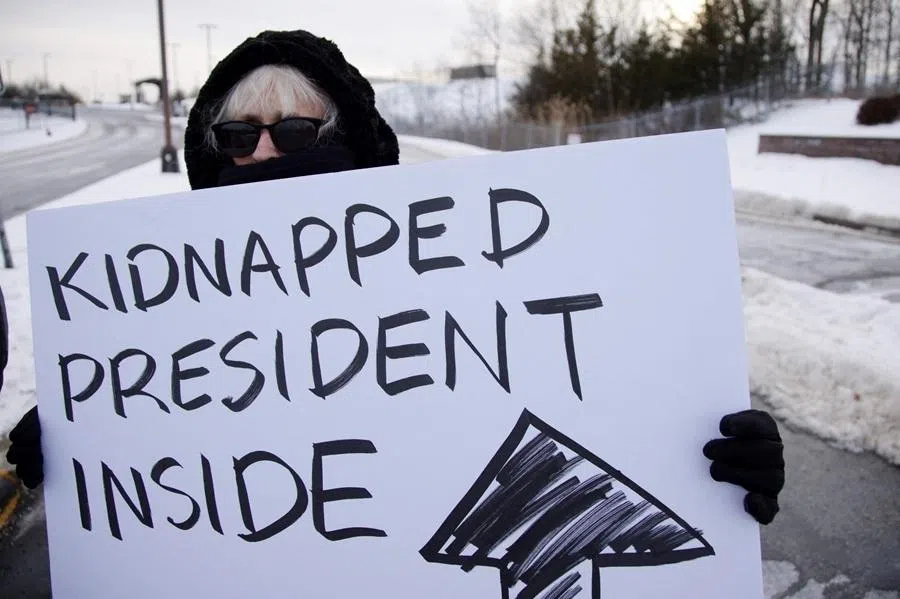What do the official Chinese media's mixed messages on the Myanmar coup mean?
China's willingness to side with the Myanmar military and the SAC regime has been evident since the immediate aftermath of the February 2021 coup, despite its apparently mixed messages, say researchers Su Mon Thazin Aung and Nan Lwin. Through its state media, China has in fact consistently transmitted messages largely in favour of the military takeover of its smaller neighbour and sought to pin anti-Chinese sentiment in Myanmar on the West's moves.
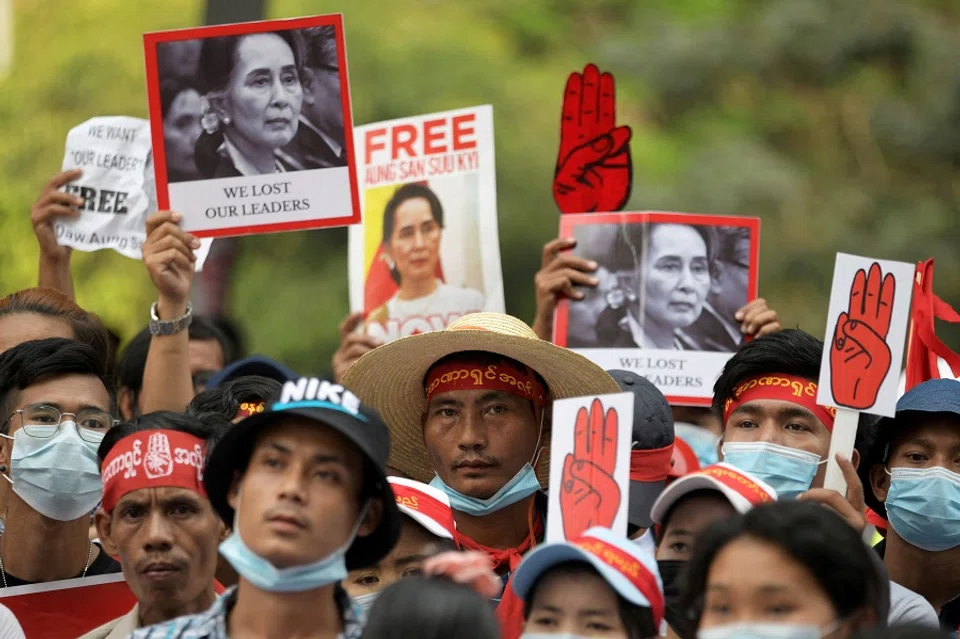
The stance that China, as a major power and the neighbour that shares Myanmar's longest land border, has taken toward the 1 February 2021 coup in Myanmar and the resultant State Administration Council (SAC) junta is crucial to prospects for Myanmar's return to a democratic path.
The Myanmar public has various expectations of China's reaction to the military takeover. Some observers hold that China will always support the military, serving as its foreign patron. However, others argue that the stakes are now higher for China than in the past and that it has had much to lose from the coup and the ensuing political turmoil in Myanmar.
The latter argument is grounded in two basic premises. First, in the past decade, China has invested heavily in a series of projects related to the China-Myanmar Economic Corridor. Second, to ensure the security of its investments in Myanmar, China cultivated warm ties with Daw Aung San Suu Kyi and her National League For Democracy (NLD) party before and during the party's 2016-2022 tenure in government. That same period saw a slight retreat in China's relations with the Myanmar military, as the latter attempted to diversify its sources of support for its modernisation programme.
... towards the end of 2021, analysts observed that China's approach to the Myanmar crisis shifted from one of cautious and balanced diplomacy to one marked by the resumption of elite-level contacts with the military.
Given the above, the February 2021 coup represented a serious setback for China, as it made uncertain the prospects for China's multi-billion dollar projects in various parts of the country. Therefore, it seemed natural that China would carefully hedge its bets in the face of the crisis that followed the coup.
The prevailing view following the coup was that, although China might not side clearly and decisive with the pro-democracy forces resisting the SAC, neither would it offer the same level of backing to Myanmar's notorious military as in the pre-2011 era that preceded the country's short-lived democratic decade.
However, towards the end of 2021, analysts observed that China's approach to the Myanmar crisis shifted from one of cautious and balanced diplomacy to one marked by the resumption of elite-level contacts with the military. Gradually indicating its recognition of the SAC as Myanmar's de facto government, China relaunched working relationships with Myanmar ministries after months of the latter's efforts to re-engage with their Chinese counterparts. Talks between China's State Councilor and Foreign Minister Wang Yi and the SAC's foreign minister during the latter's working visit to China in April 2022 seemed to confirm Beijing's support for the junta.
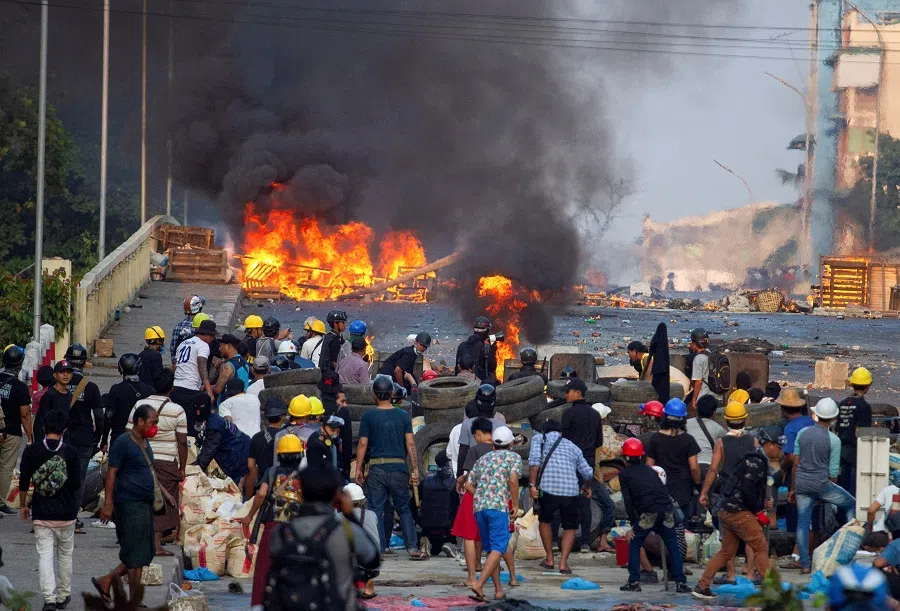
In fact, China's willingness to side with the Myanmar military and the SAC regime has been apparent from the period immediately following the February 2021 coup, despite its apparently mixed messages. Through its state media, China has all along transmitted messages largely in favour of the military takeover of its smaller neighbour. Those media have elaborated a consistent message that highlights three core points.
First, the Myanmar military's course of action has been constitutional and fell within the bounds of Myanmar's internal affairs. Second, China therefore adheres to a non-interference principle and encourages the international community to do likewise. And, third, China will nevertheless show no mercy to anti-Chinese elements who seek to undermine its economic interests in Myanmar by protesting against the junta or against Chinese investment projects. An analysis of 133 articles on Myanmar's 2021 coup in English released by a Chinese state-run news agency and appearing in a Communist Party-backed newspaper supports these hypotheses.
China's expression of support for ASEAN's five-point consensus on dealing with the Myanmar military also reflected its backseat position in responding to the crisis.
China's mixed messages
To the general public, China's initial reactions to the 2021 Myanmar coup did not seem as bold as in the past. At first, China neither condoned nor supported the military coup or the SAC junta that it had installed. With anti-Chinese sentiment grounded in the belief that Beijing was close to the military at a high in Myanmar, China abstained from voting for the 18 June 2021 United Nations General Assembly (UNGA) resolution on the situation in Myanmar calling for an end to the flow of arms into Myanmar and for the Myanmar armed forces to respect the results of the 2020 election.
Moreover, China and the US agreed in late September 2021 to allow Myanmar's NLD-appointed ambassador to the UN to continue representing the country before the world body, effectively barring Myanmar's coup-makers from addressing the UNGA's meeting that month.
China's expression of support for ASEAN's five-point consensus on dealing with the Myanmar military also reflected its backseat position in responding to the crisis. This included upholding the association's October 2021 decision to invite only a non-political Myanmar representative to ASEAN summits. At the ASEAN-China summit in November 2021, the Myanmar seat was left empty, in a reflection of China joining international efforts to deny SAC representation of the country at high-level political meetings.
At the bilateral level, China also suspended border trade with Myanmar for months and tightened regulations governing that trade. Though this move was partly motivated by concerns over cross-border Covid-19 transmission, it nevertheless had a devastating impact on Myanmar farmers and exporters who were already facing huge losses from existing Covid-19 restrictions.
China's intention to work with the Myanmar military was apparent shortly after the coup.
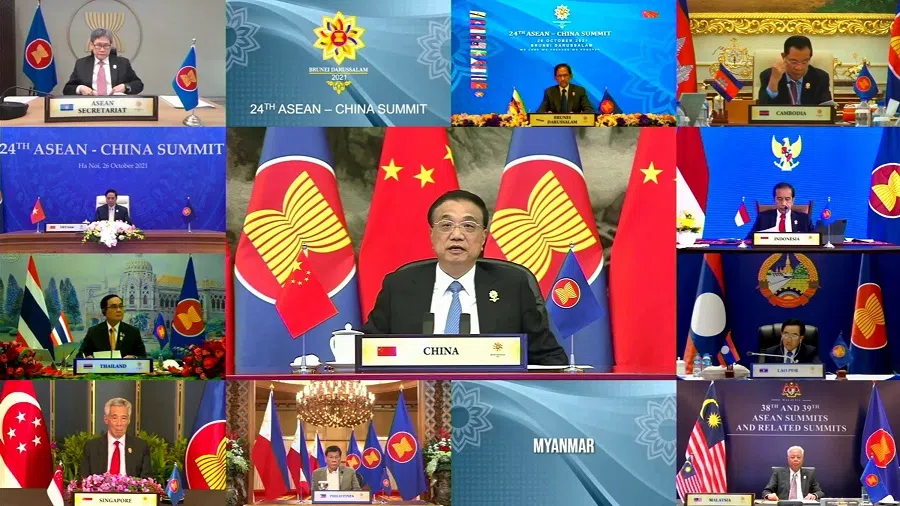
However, this mixed public messaging was part of China's strategy on the international stage to avoid being seen as one of the main supporters of the coup. One should not assume that China's support for the Myanmar military is under uncertainty or in doubt. Rather, China's intention to work with the Myanmar military was apparent shortly after the coup.
On 27 March 2021, barely two months after the coup, the Chinese ambassador attended celebrations on Myanmar Armed Forces Day, despite strong public outcry. And, even though an SAC representative was not invited to join the virtual ASEAN-China summit on 22 November 2021, the Chinese ambassador to Myanmar briefed the junta's foreign minister on its discussions and outcome almost immediately afterwards. Five months after the coup, the ambassador also met junta supremo Senior General Min Aung Hlaing in Naypyitaw.
Similarly, despite the consequences of its zero-Covid policy for bilateral border trade with Myanmar, China provided its neighbour with more than 50 million vaccine doses in the post-coup period - a quantity sufficient to fully vaccinate half of Myanmar's population.
In fact, this pattern of activity corresponds to a consistent and clear official Chinese narrative on the 2021 coup in Myanmar.
Notably, English-language official Chinese media seldom gave space to news stories on forces resisting SAC rule after 2021, such as the National Unity Consultative Council (NUCC), the National Unity Government (NUG), or the People's Defence Force (PDF).
Creating a narrative
China's state media is known for influencing, persuading and distracting audiences. From a look at 133 news articles from the Chinese state-run and Communist Party mouthpiece English-language media - the Xinhua news agency and the Global Times, a Chinese Communist Party-backed newspaper - published between 1 February 2021 and 30 April 2022, we examined China's position on three key issues: the nature of the 2021 coup and of the SAC, international responses to and intervention against the coup and the coup regime, and the Myanmar public's views of China's economic interests in Myanmar.
Table 1: Articles selected from Chinese state media for discourse analysis (Source: ISEAS)
It is clear that these two media outlets aggressively published articles concerning Myanmar issues, starting from the period immediately following the coup. Among the 133 articles analysed, more than 90 appeared between 1 February and 30 April 2021, when anti-China sentiment in Myanmar was reaching its peak. These mostly advanced the narrative that the US and pro-Western groups spearheaded anti-China sentiment in Myanmar.
From June 2021 onwards, the number of articles touching on Myanmar decreased, and their focus slowly shifted from coverage of the coup and anti-China sentiment to socioeconomic issues in China-Myanmar relations. News items discussed the Covid-19 situation in Myanmar, bilateral economic relations, and the situation at the border between China and Myanmar.
China has shown unwavering support for the Myanmar coup-makers of 2021 since the early days following their seizure of power.
Notably, English-language official Chinese media seldom gave space to news stories on forces resisting SAC rule after 2021, such as the National Unity Consultative Council (NUCC), the National Unity Government (NUG), or the People's Defence Force (PDF).
When the NUG's acting president announced a defensive war against the SAC regime in September 2021, the Global Times ran an article stating that the open support of the US and the West for the NUG and PDF might lead Myanmar into a civil war, thus framing events in the country with reference to the US-China geopolitical rivalry.
The analysis also finds that China has shown unwavering support for the Myanmar coup-makers of 2021 since the early days following their seizure of power. It has carefully packaged its media message to advance the view that the coup was nothing more than a constitutional act by the Myanmar military in the country's domestic affairs.
The discourse analysis of China's articulation of its overall position on the coup and the international responses to it discovers the prevalence of an ostensibly constructive tone, featuring the use of positive words. But in news items concerning China's economic interests, however, these official media demonstrate instead a switch to a negative tone.
The following figures compile findings from the discourse analysis, revealing the Chinese media's employment of contrasting words in their coverage of the three issues noted above. They indicate the frequency in articles of commonly used words relating to China's position on the coup, international responses to the coup, and to China's economic interests in Myanmar.
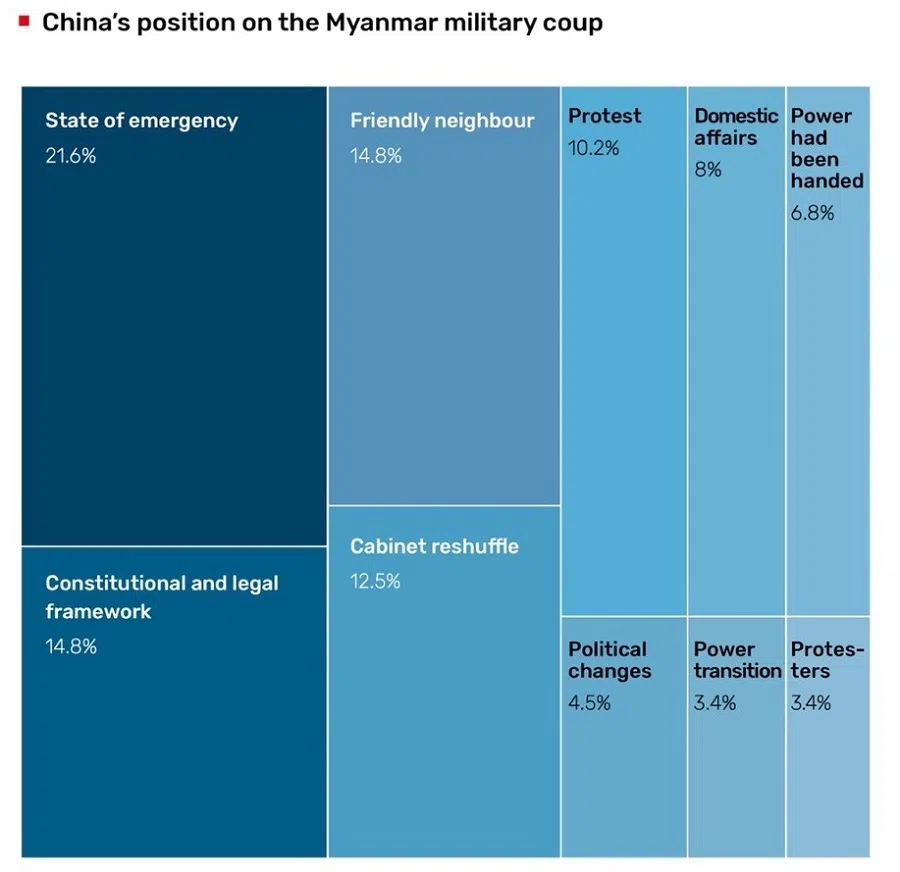
They consistently framed the Myanmar military's seizure of power as a constitutional act, though without mentioning the fact that the country's 2008 Constitution was drafted under a military regime and thus granted disproportionate power to the military.
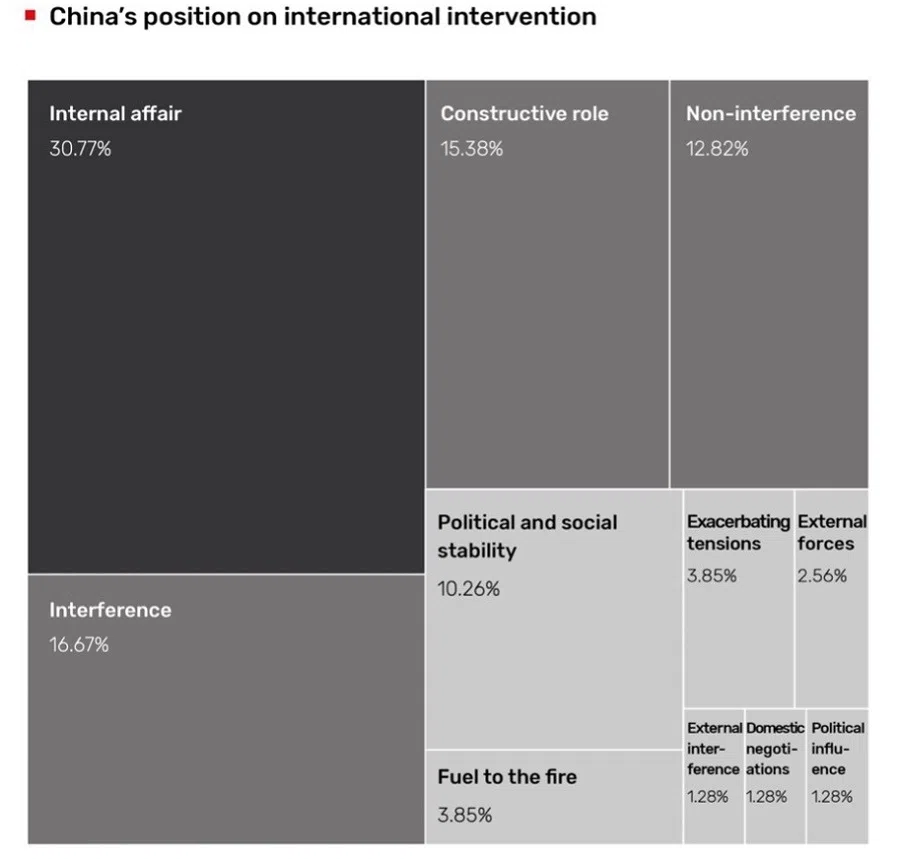
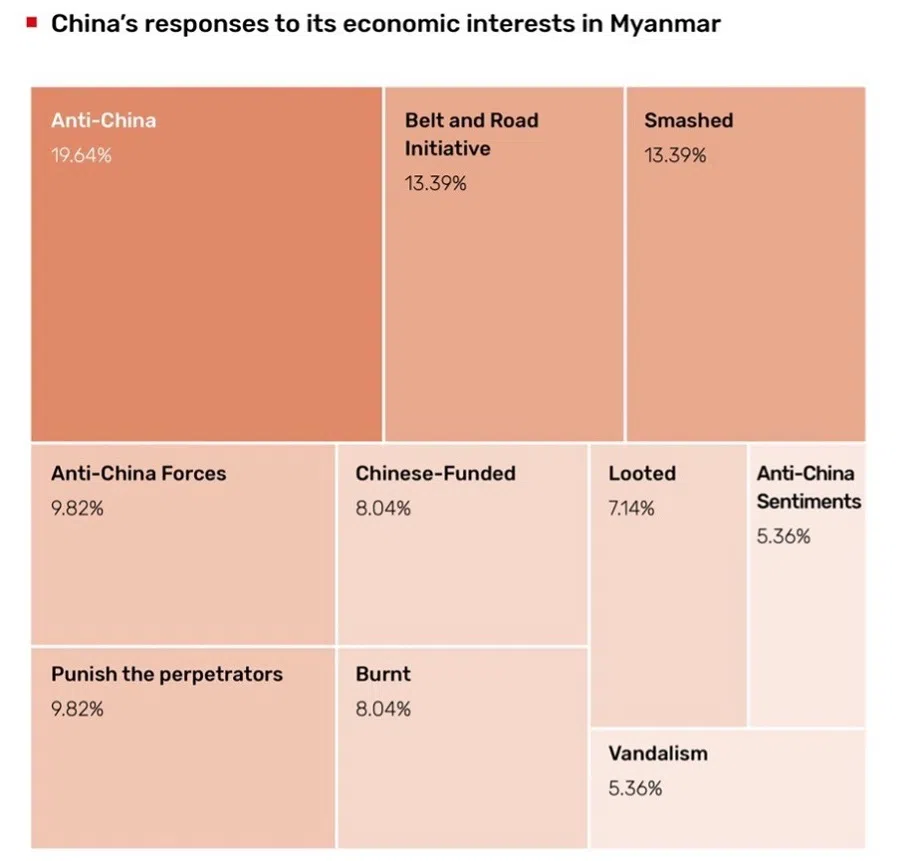
These Chinese state-run media referred to a tragic event that crushed hard-won democratic reforms and overthrew the elected civilian government merely as "a major cabinet reshuffle".
Framing the 2021 Myanmar coup
Discourse analysis of the 133 news articles shows that Chinese media exercised caution in portraying events relating to the coup through the use of euphemistic language. They consistently framed the Myanmar military's seizure of power as a constitutional act, though without mentioning the fact that the country's 2008 Constitution was drafted under a military regime and thus granted disproportionate power to the military.
Since 1 February 2021, the Global Times and Xinhua have downplayed military control of the country, avoiding labelling the military takeover as a coup d'etat. These Chinese state-run media referred to a tragic event that crushed hard-won democratic reforms and overthrew the elected civilian government merely as "a major cabinet reshuffle".
Articles in the Global Times consistently avoided any word or text implying that the Myanmar military seized state power, and instead stated that "state power has been handed over to the commander-in-chief of the armed forces". Unlike articles from international media agencies, those in the Global Times omitted critical information on topics such as the reason that power was allegedly handed over to the military and the role of the vice president in the seizure of power. Among readers with little knowledge of political developments in Myanmar, this (mis)representation may induce the understanding that the civilian government for some reason transferred power to the military willingly.
Chinese media justified the military coup as "an adjustment to the country's dysfunctional power structure".
Articles in the Global Times have described the coup as a "political event", a "political change", a "power transition", a "political reshuffle", and a "domestic incident". The use of those terms unsurprisingly ignited the anger of many Myanmar people, who were already outraged by the military takeover.
In addition, the official Chinese media portrayed the coup as part of a deep-seated conflict between the NLD and the military and discredited the reforms of the last decade by saying, "political reforms failed to provide any impetus to solve deep-seated problems, nor did they provide a safety valve to avoid repeated political wrangling".
Official Chinese media have also avoided conveying messages that would tarnish their country's relations with the Myanmar military. In describing the coup of 1 February 2021, English-language Chinese media repeatedly employed the phrase "state of emergency", avoiding words that would have described the situation clearly, such as "coup d'état", "overthrow", or "power seizure".
In the period following the coup, when pronounced anti-China sentiment emerged across Myanmar, the Global Times emphasised the narrative that China was a "friendly neighbour" and had "good relations" with both the civilian government and the military. Furthermore, Chinese media justified the military coup as "an adjustment to the country's dysfunctional power structure".
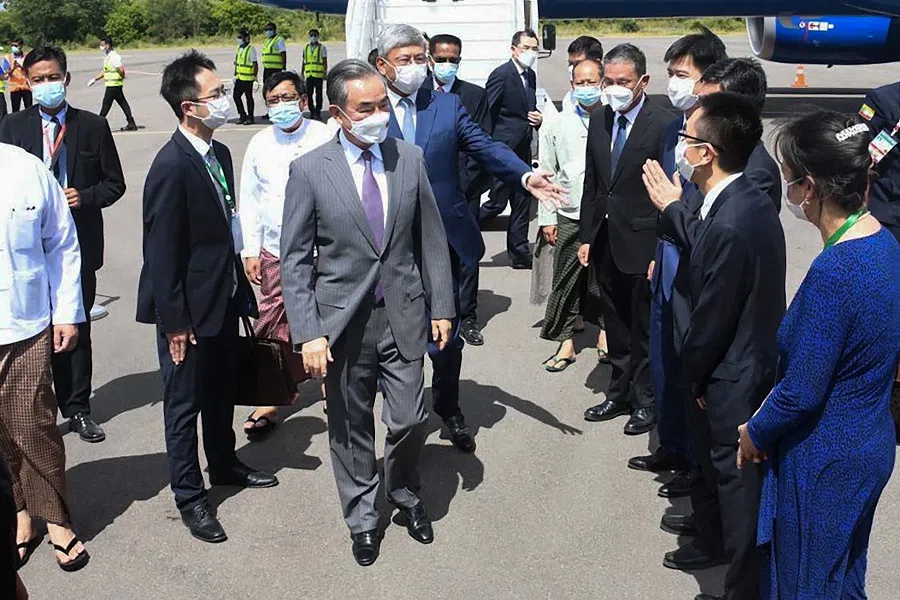
Moreover, Chinese Communist Party media framed the coup in a way that placed events within the bounds of the 2008 Constitution. Articles often directly quoted Chinese Foreign Minister Wang Yi and his spokesperson saying that the political crisis in Myanmar should be resolved under "the constitutional and legal framework", in order to achieve social and political stability in the country.
Through its narrative of power adjustment under Myanmar's constitution, the Chinese Communist Party's English-language media suggested to the world China's willingness to resolve the Myanmar crisis within Myanmar's existing constitutional and legal framework. This solution appeared to be at least indirectly aligned with the preferences of the Myanmar generals who have repeatedly justified their coup as constitutional.
The description of Myanmar's crisis as "internal affairs" serves China's objective of warding off, or at least delegitimising Western political influence on its close neighbour, where several China-backed strategic projects are planned under the Belt and Road Initiative (BRI).
Promoting non-intervention
Despite its mixed messages on the Myanmar crisis, through messages that gave the appearance of a balanced Chinese approach, Beijing's state-run English-language media have been consistent in stressing that the crisis is Myanmar's internal affair, and other countries, including China, should not interfere in Myanmar's domestic issues. To do otherwise, according to these state media, would be to exacerbate tensions in the country.
The description of Myanmar's crisis as "internal affairs" serves China's objective of warding off, or at least delegitimising Western political influence on its close neighbour, where several China-backed strategic projects are planned under the Belt and Road Initiative (BRI). At the same time, Chinese media have described the US response to the coup as "external interference" and "external forces", implying that Washington was using Myanmar's situation to revive its global leadership.
This emphasis on "internal affairs" contradicts the demands and expectations of Myanmar's pro-democracy supporters, who wish to see effective international intervention to overthrow their country's post-coup military regime. The English-language Chinese media's choices of narrative provoked negative responses from Myanmar people on social media, including posts asking whether China would view blowing up the twin China-Myanmar pipelines that traverse their country as an internal affair, too.
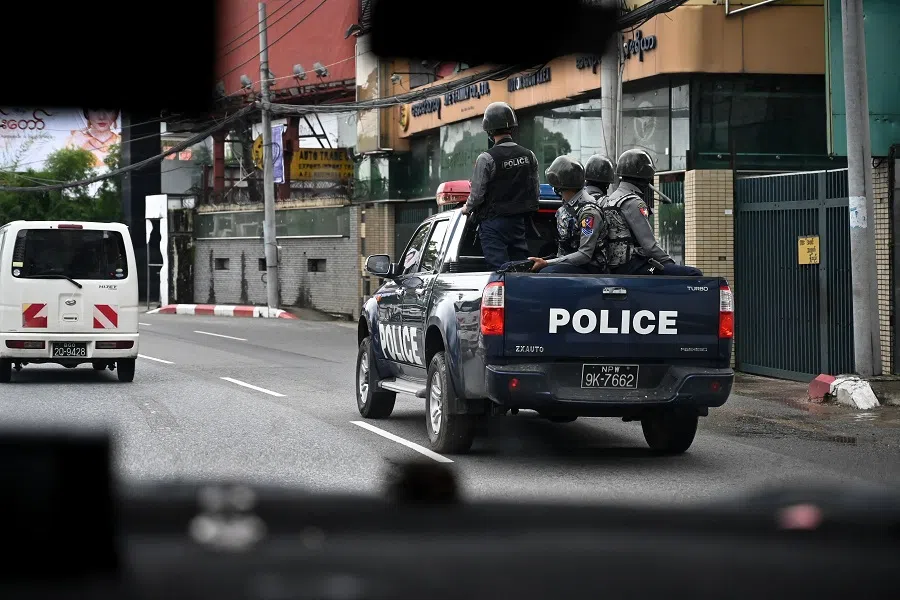
The repetition of the term "non-interference" reinforces the position that other countries, including China, should maintain a policy toward Myanmar marked by that approach. It also implies the idea that ASEAN is on the same page as China, through allusion to ASEAN's historic non-interference principle.
Chinese media have also highlighted Beijing's opposition to any Western actions against the Myanmar military, including targeted sanctions. They call attention to the notionally negative consequences of such efforts such as "exacerbating tensions" and adding "fuel to fire". In contrast, these media employ positive adjectives to describe the "constructive role" that China continues to play when addressing Myanmar's political situation.
While pro-democracy supporters were facing a deadly crackdown by SAC security forces, the Chinese media discourse was egging the junta on, urging it to take severe action against the people.
Protecting Chinese economic interests
Although Chinese media systematically downplayed the seriousness of the Myanmar crisis by using positive words, they deployed negative language, indicating credible threats against anti-Chinese protestors in Myanmar, in their coverage regarding Chinese interests. After attacks on 14 March 2021 striking Chinese factories in Hlaingthayar Township, an industrial zone on the outskirts of Yangon, Chinese state media repeatedly urged the SAC to take serious action against the perpetrators.
While pro-democracy supporters were facing a deadly crackdown by SAC security forces, the Chinese media discourse was egging the junta on, urging it to take severe action against the people. The repetition in those media of the phrases "effective measures", "concrete measures," and "punish the perpetrators" may have emboldened the SAC to announce martial law in several townships with pronounced anti-junta activity.
The discourse in the Global Times indicated China's awareness of the significant rise in anti-China sentiment in post-coup Myanmar. However, it also claimed that actors in Western countries such as think tanks, NGOs and the media were responsible for the growing anti-China sentiment in Myanmar. Indicting these actors as "anti-China forces", Chinese media alleged that the West's moves were aimed at capturing the opportunity to turn Myanmar into a more pro-Western country and to smear China's reputation. These allegations ignored the reality that anti-China sentiment among Myanmar people had risen dramatically on its own, in response to China's failure to denounce the coup.
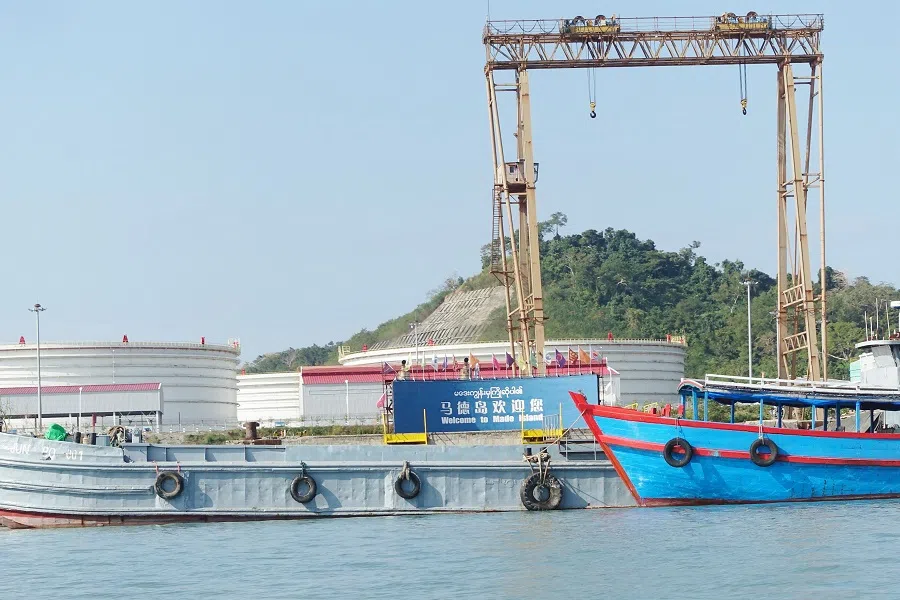
Official Chinese media also tried to establish that Western anti-China forces were smearing China-backed BRI projects in Myanmar. Notwithstanding these smears, articles in the Global Times offered assurances that there would be no change in China's determination to push forward with BRI projects, as Myanmar had already made tremendous efforts to push for the China-Myanmar Economic Corridor under the BRI.
In contrast, they have depicted the rising anti-China sentiment that led to the destruction of some Chinese investments in Myanmar within the context of China-US rivalry...
Minimising losses
Sino-Myanmar relations are not monolithic. It is apparent that China, which always aims to preserve functional stability to safeguard its strategic and economic interests, has carefully crafted its relations with a range of counterparts in Myanmar - the military, the elected NLD government, ethnic armed groups and the public.
Having cultivated a good relationship with the now ousted pro-democratic leader Daw Aung San Suu Kyi and the NLD government that she led, and invested heavily in infrastructure projects in various parts of Myanmar in the past five years, China has faced the risk of huge economic losses in the wake of the 2021 coup. It now seems to be seeking to limit or even head off those losses by siding with the military through quiet diplomacy.
Despite sending mixed messages in the international arena, China has clearly conveyed its position on the coup and post-coup regime in Myanmar, regarding international intervention, and its economic interests in the country through its mouthpiece news outlets since early February 2021. It appears to have been supportive of the coup makers from the start.
The analysis presented here illustrates the significant divergence in China's state-owned English-language media between characterisations of the coup and the SAC on one hand, and of people involved in anti-military and anti-Chinese protests on the other. The coup has been framed as nothing more than the playing out of constitutional processes, legitimately carried out by the military.
In contrast, they have depicted the rising anti-China sentiment that led to the destruction of some Chinese investments in Myanmar within the context of China-US rivalry while omitting coverage of China's reaction to anti-China protests such as its request to the SAC to arrest protestors, and using official media to support the junta.
In general, these framing exercises and associated developments reaffirm China's role as a foreign patron for the Myanmar military. It plays this role despite its well-developed relationship with the elected civilian government of the half decade preceding the coup. These Chinese narratives on the Myanmar crisis also support China's claims that the West continues to fuel anti-Chinese sentiment in the region.
This article was first published by ISEAS - Yusof Ishak Institute as a Fulcrum commentary.
Related: Why Myanmar people believe there is Chinese involvement in Myanmar coup | Chinese researcher: Why China avoids taking a strong stand on Myanmar | ASEAN-China relations stay robust despite Myanmar's absence from virtual summit | A rising China needs to demonstrate moral courage on Myanmar issue | Why China has everything to lose from Myanmar coup | Why Myanmar people are wary of a 'pauk-phaw' (sibling) relationship with China | Sinophobia in Myanmar and the Belt and Road Initiative






